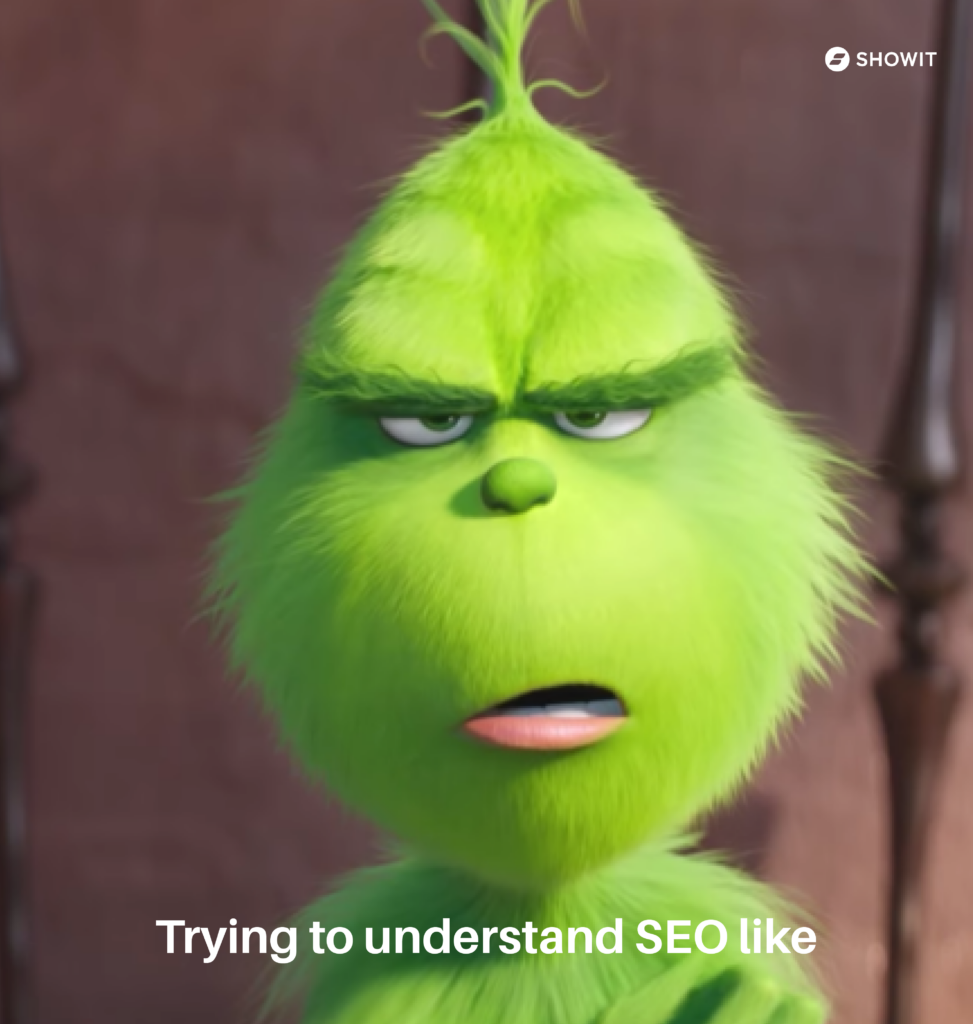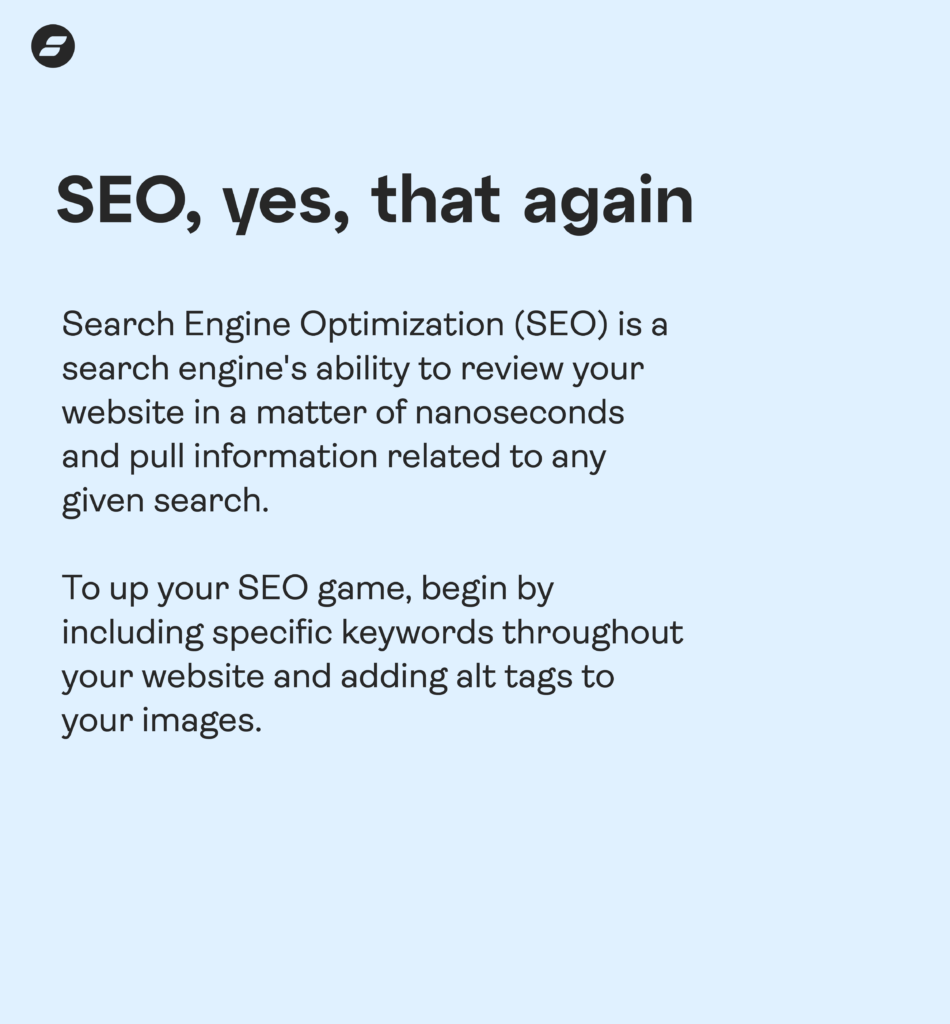So, you wanna see your website pop up at the top of the results page when somebody searches on Google? Hey, who doesn’t?
While we wish we could say we had a quick fix for you, one that could bump up your standing on Google over the course of just a few days, optimizing your website for search engines is a practice that takes time. The good news is that most businesspeople who have done it will agree: the time and effort are well worth it!
What you need to do is take advantage of search engine optimization (SEO). With consistency, you can see your website start to work its way higher and higher on search results pages.
How long it takes for SEO to work will depend on several factors, so let’s break it down and discuss how you can get the best results for your business.
Back Up: What Is SEO, Again?
Good question! SEO stands for search engine optimization, and it’s pretty much a necessity for every business website (and probably a few hobby websites too).

SEO sounds like the sort of thing that would be super technical and tough to understand. The idea behind it is actually pretty simple.
Optimizing your website for search engines is exactly what it sounds like: making your website appealing to search engines like Google, so they’re more likely to put your site in front of users (that is, the people searching for info on Google).
You can do this in several ways, but the one we’re focusing on today is using keywords in your website content.
Think about all the words that people are searching for on Google and other search engines. We call these keywords, even though often they are specific phrases combining more than one single word. You can use these keywords on your website, not only in body copy but also in headlines and subheads. This indicates to the search engines that you have relevant content these users are looking for.
Making effective use of keywords involves a few key steps — and it’s just one of the many factors that affect your ranking in search results. Dive deeper by reading “How to Master SEO for Showit Websites: The Ultimate Guide.”
Does SEO Really Matter for My Business?
The short answer here? Yes, of course! You want your website to get more visibility, and that’s what SEO is all about. SEO gets your business website a more prominent place in search results, which means it’s ultimately noticed by more people. More traffic to your website often leads to more conversions.
Of course, there are many factors that affect whether someone on the internet ultimately becomes a paying customer. SEO is still one of the best ways you can get your name out there more prominently and build brand awareness. There are two main reasons for this.
First, it helps build trust, as people will see your website as more credible than an obscure site constantly buried on page 10 of Google’s search results.
Second, it’s also cost-effective, because unlike paid advertising, in which you spend money with Google for prime placement on its results page, SEO doesn’t require anything from you other than the time you spend researching keywords, creating content, and tracking your results.
On that note…
How Should I Measure My SEO Results?
Once you’ve put the time and effort into optimizing your website for search engines (including regular content that makes smart use of keywords), you need to take the time to figure out what’s working and what’s not. You do this through metrics known as key performance indicators, which are usually called KPIs for short.

Best SEO Metrics to Track
Think of KPIs as a sort of score for the game of SEO. You want to do better on as many of these metrics as you can, because a combined higher score means your website gets more prominence with search engines. Some of the KPIs you want to track are:
· Impressions: The number of people who actually saw your link
· Clicks: How many people actually clicked on your link
· Keyword ranking: How your website ranks with search engines for keywords related to your business
· Conversions: How many of the people who clicked through to your site actually did what you wanted them to do (e.g., make a purchase or sign up for your newsletter)
· Bounce rate: How many people left your website after looking at just one page
· Pages per session: The number of pages people visited on your site before they ultimately left your site
· Session duration: How much time people spend on your site
Best Tools to Track SEO
Here’s the hard part, though — you can’t track all these numbers on your own. You can’t tally the number of click-throughs to your site unless you’re using the right analytic software, of which you have a lot of options.
Here’s what you should know about some of the top picks:
· Google Analytics: A free tool by Google that gives you insight into website performance, traffic, and conversions
· Google Search Console: Another free tool from Google that lets you monitor how you appear in search results and gain data on search performance
· SEMrush: A good option for researching keywords, as well as for auditing your website based on backlink analysis (how many outside websites are linking back to you) and competitive analysis (how you compare with similar businesses)
· Ahrefs: Like SEMrush, another good option for backlink analysis and competitive analysis
· Moz: A good tool for auditing your site, assessing your credibility standing (do search engines perceive you as credible?), and tracking how you rank in search results
· Ubersuggest: A good tool for researching keywords that people are searching for, so you can use them in your web content
· RankMath: A plug-in for WordPress that lets you analyze your content based on how it will be perceived by search engines
BONUS TIP: Grab a great template that ups your aesethic and boosts your SEO in the Marketplace.

What Kind of SEO Results Can I Realistically Expect?
You might be reading this and thinking, “SEO sounds like a lot of work! I need to research keywords, create content, and then analyze how everything performs… So, realistically speaking, how long does SEO take to work?”
Here’s the thing you need to keep in mind: You shouldn’t expect your SEO efforts to show results immediately, even if you’re doing everything right. Instead, you should be focused on consistency, so you can see good organic traffic over time.
This is traffic you’re not paying for through advertising, so you don’t need to worry about it dissipating as soon as you stop running ads. Ultimately, your goal is to get better visibility that will lead to better brand awareness — and that will lead to more purchases!
How Long Does SEO Take to Work?
“Yes… but again, the important question: How long does SEO take to work?”
It’s not overnight. A realistic answer might be four to six months. We know that might sound shocking (and even unappealing) to some business owners out there. After all, a whole six months? That’s half a year! As with all things that demand consistency over immediate gratification, better web traffic through SEO seems like the type of thing that will take forever.
Don’t lose sight of the reality that four to six months, in the grand scheme of things, really isn’t all that long — it will go by faster than you realize, and when it does, you’ll be glad that you started today instead of waiting.
That said, don’t assume that the second the calendar marks four months from the date you posted an article, your page views will suddenly skyrocket. SEO is far from an exact science, so your results could be gradual at best — or you could create a unicorn piece of content that gets thousands of hits almost immediately. It’s really hard to tell.
The one thing we can be sure of? Like cream, the content that’s best will rise to the top. So as long as you stay focused on providing value, your efforts will eventually pay off.
Why the Heck Does SEO Take So Long?!
Organic traffic builds slowly, especially when you compare it with paid traffic. Search engines prioritize websites with authority that can be perceived as trustworthy. This isn’t the kind of reputation you can establish in a short period of time.
The reason SEO takes so long to show results depends on several factors, including:
· Crawling: This is when search engines send bots that “crawl” through your website and read its content so they can report back about the quality of your site. This process sometimes takes several weeks.
· Indexing: This is when a search engine categorizes your website in its database as determined by what the bots reported back when crawling. This is something that has to be done before your website can be considered for searches.
· Keyword competition: This refers to how many other websites are also trying to rank for the keywords you’re creating content for (and how authoritative their sites are). As your website consistently starts creating relevant content, search engines will start to perceive it as a more valuable resource and ultimately will be more likely to prioritize it.

How Can I Improve My SEO Results?
There’s no one-size-fits-all pathway toward improving your SEO results. Instead, it’s a combination of many factors — some of which might be easier for you than others, or might be a better fit for your business compared with your competition.
These are the four big factors you need to observe if you want to achieve the most success:
· Research your keywords: Look for keywords that people are searching for, but remember that the most popular keywords with searchers will also be the keywords that most businesses are using (and therefore might be a little harder to rank for). Mix up popular keywords with more obscure ones for best results.
· Focus on quality content: Don’t create content just for the sake of stuffing in as many keywords as you can. Instead, focus on quality content. Yes, keywords are important, but if your content is subpar, users will quickly take notice and won’t spend a lot of time on your website. They might even be less likely to come back. All of this can diminish your standing with search engines.
· Fix the tech glitches: If you have a glitchy website, your visitors aren’t going to have a good experience. Search engines don’t want to send users to a site where they’ll have a bad experience. So, if you have problems with site speed or mobile-friendliness, your website won’t be considered optimized. Take care of as many tech aspects as you can, from the common ones we just described to the more obscure ones, like creating descriptive alt tags for images.
· Build links within your site to other (credible) sites: Linking to other credible websites establishes that you are reliable and trustworthy. After all, you wouldn’t be linking to the website of a leader in your industry if you didn’t know your stuff, right? When you have plenty of links within your content that go to credible sites, it establishes you as credible by association, and this will boost you within a search engine’s ranking.
Is Showit Good for SEO?
Our goal at Showit is to make it easy for you to have the best website possible. We recognize that a big part of that is helping you optimize your site for searches, even if you’re not a techy person. After all, what’s the point of building a beautiful, efficient website if nobody sees it?
That’s why we created Showit with all kinds of resources that make search optimization easy, from step-by-step directions on creating meta descriptions for your pages to tools that will prevent you from building a website that lags at a slow pace.
We also have plenty of resources helping you better understand SEO, so you can always strive to keep improving your site’s visibility. Be sure to check out our past blog posts like How to Write the Best Titles for SEO (And Your Audience) or Blogging for SEO: It’s Not as Scary as You Think!
Stay the Course — Your Showit SEO Results Are Worth It!
Above all, just remember the old adage: Good things come to those who wait.
It’s certainly true in the case of SEO — this is a practice that requires some dedication and patience, but those who stick to it are the ones who make it to the top of the Google search page. When you take the time to research the right keywords, create the best content you can, and actually track your metrics so you can continue learning and improving everything you do, you’ll see real payoff with long-term growth and increased opportunities for your thriving business.
Want to create that dream SEO-friendly website of yours with Showit (you know, so you can see for yourself just how easy we make it)? Don’t forget that we have a free trial that gives you 14 days to experiment with all our tools, without ever even entering any credit card information. All you need is your email address, so go ahead — sign up and start creating your site today!

Casandra is a born and bred East Coaster who finds herself braving the heat of the Valley of the Sun with her husband and three cute kids all for the love of Showit.
